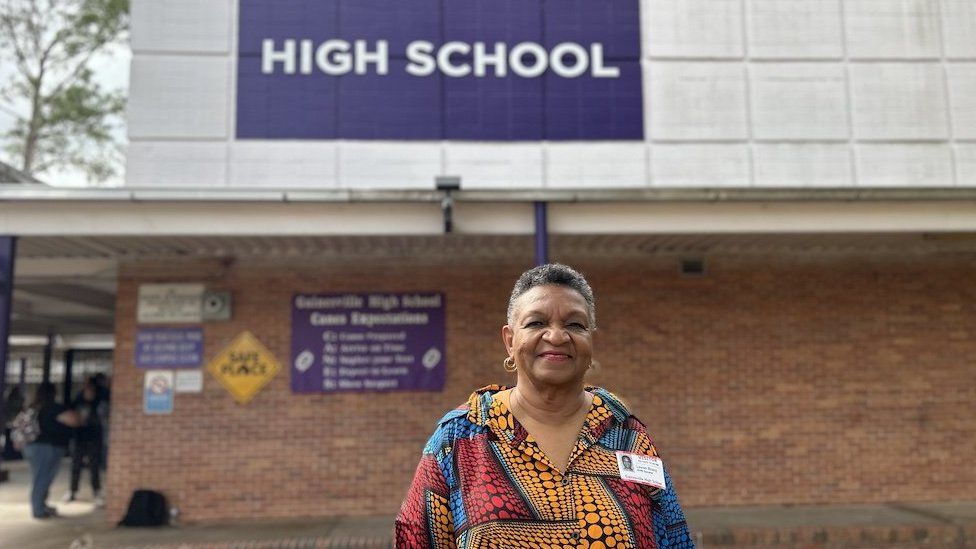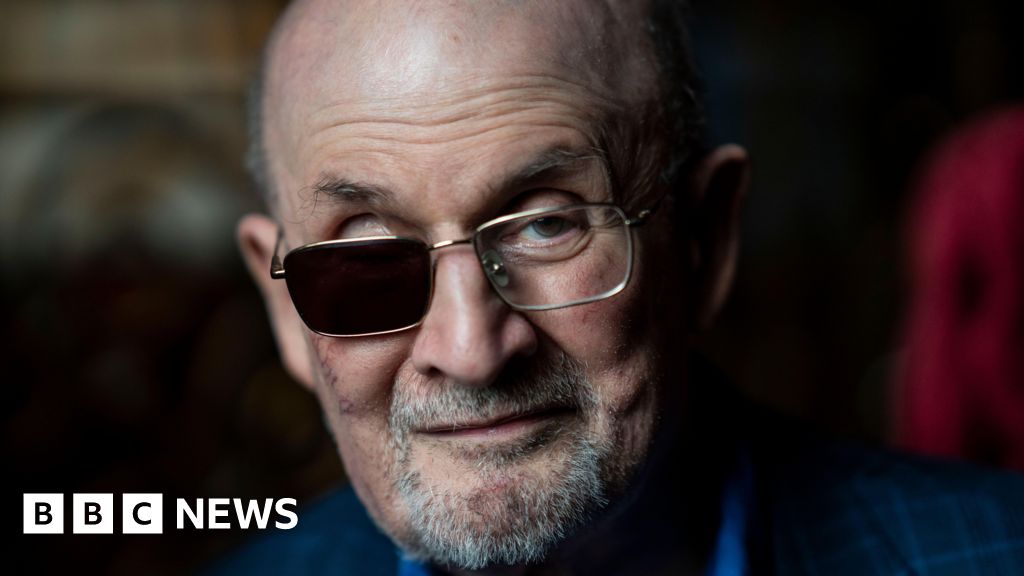ARTICLE AD BOX
 Image source, Chelsea Bailey, BBC News
Image source, Chelsea Bailey, BBC News
Nearly 60 years ago, LaVon Bracy helped integrate Gainesville High School in Florida
By Chelsea Bailey & Brandon Drenon
BBC News in Gainesville, Florida
Florida is leading a national movement by Republicans to reshape how and what schoolchildren are taught about race. Governor Ron DeSantis is spearheading the crackdown on what he calls "woke" ideology. But teachers in the state told the BBC that the changes have had a chilling effect, with many fearing they may break the law if they discuss the realities of US history.
WARNING: Contains graphic descriptions of racist abuse
It has been 58 years since LaVon Bracy became the first black student to graduate from Gainesville High School in Florida. But still, she finds it difficult to visit.
"It brings back too many memories," Ms Bracy, 74, said over lunch in a diner near the school.
Memories of how she was routinely tormented by her white classmates, who spat on her, called her the N-word and beat her so badly that she needed stitches on her scalp - all because she was one of the first black students to integrate the school in 1965.
For decades Ms Bracy has spent the month of February, Black History Month in the US, travelling to schools to share her story of perseverance in the face of a violent, racist backlash to school integration.
But this year things were different.
Typically, Ms Bracy said she's invited to speak at a dozen schools across the state. This February, she was only invited to visit two.
She blamed her decreasing invitations on recent laws that target how schools teach subjects like African-American history, race and racism. Laws that educators say are scaring them into silence, and that civil-liberties advocates say effectively amount to censorship.
"I never would have thought that 50 years later that we are in this battle we are in today," Ms Bracy said.
Florida, where 'woke' goes to die
Since July, several laws have come into force in Florida that restrict what can be taught in classrooms for children aged 5-18.
Led by Governor DeSantis, Republicans say these laws are necessary to shield children from inappropriate content and liberal indoctrination around issues of race and sexual orientation.
This week, in a speech marking the start of Florida's 2023 legislative session, Mr DeSantis reiterated his commitment to "fortifying parents' rights", saying "our schools must deliver a good education, not a political indoctrination".
Mr DeSantis, who is hotly tipped as a 2024 presidential contender, said he wants Florida to be the state "where woke goes to die".
While the term "woke" is often ill-defined, many conservative commentators use it to refer to a range of issues pushed by left-wing activists, from transgender identification to the claim that US institutions are systemically racist.
Watch: Five things to know about Ron DeSantis
Some parents, like Aly Legge, a Florida mother of five who identifies as multiracial, have praised the changes, which she feels will protect her children from learning that they are "perpetually a victim".
She said she believes teachers should teach history without making children feel guilty for being white or that they are "inherently racist".
One law, HB 1467, requires the state's stamp of approval for all school books used in public classrooms. Educators found in violation of the law could be charged with a felony and face up to five years in prison.
Since its passage, over 170 books have been removed from shelves while they wait to be vetted, including books like The Life of Rosa Parks.
Another law, the Stop W.O.K.E. Act, states "curriculum may not be used to indoctrinate or persuade students" and seeks to ensure that no child feels "guilt or anguish" or "psychological distress" during lessons on topics like slavery in America.
In November, a Florida judge blocked the Stop W.O.K.E. Act from being enforced in colleges and universities following a lawsuit that argued it violates the US Constitution. But for most public school students who aren't in college yet, the law remains in effect.
'Confusion and censorship'
Experts say the language in the law is vague and leaves teachers to guess which historical facts are now illegal.
"Indoctrination, that's not a legal term, that's a judgement. It's in the eye of the beholder," said Rebecca Bratspies, a law professor at the City University of New York School of Law.
Without clear guidelines for what teachers can and cannot say, Prof Bratspies said teachers will likely operate out of fear.
"I wouldn't know what I could or couldn't teach in the classroom."
The BBC reached out to dozens of teachers to ask about the effects of the new laws. Of those who chose to speak, most only did so if they could remain anonymous.
Every educator who spoke to the BBC denied that "indoctrinating" conversations around race and white supremacy were happening in their classrooms. Instead, they said, it was difficult to teach classes on slavery and the civil rights movement without confronting the deeply rooted racism at the heart of the American experiment.
Image source, Getty Images
Image caption,Demonstrators protested in February against Governor DeSantis' plan to eliminate a high school course in African-American history
The BBC made multiple requests to Florida's Department of Education to clarify what exactly constitutes "indoctrination" or forcing "guilt and anguish" upon students, as explicitly prohibited by the Stop W.O.K.E. Act. At the time of publication, officials had not responded.
For many educators, the lack of clarity has created a climate of uncertainty and fear.
A Florida high school teacher told the BBC: "Is something I'm saying, which I think is totally innocuous, (going to) get me fired and essentially ruin my career?"
The focus has shifted from teaching to avoiding lawsuits, the teachers said.
A middle-school teacher, who also requested anonymity, said he had to fight to give a lesson on Jesse Owens, the African-American Olympic-gold winning track star and civil rights activist.
Ms Bracy said she too chose to self-censor, fearing retribution. This year, during her speech to students at Gainesville High, she did not mention that she had received death threats before graduation or that the Ku Klux Klan once burned a cross in her family's yard.
"This is the first time that I have had to think about how to tell my story rather than just tell it," Ms Bracy said. "I don't want to get anyone into trouble."
Teachers want to leave
There is also deep frustration over what students are missing.
"What Governor DeSantis has done and told us, in so many words, is that black history is not important," one middle-school teacher told the BBC.
Another reported that teachers at one Orange County high school are so demoralised that they frequently spend the lunch hour debating whether they should leave the state.
"Some of the best teachers in the state of Florida want to leave," the teacher said.
Last month, Florida lawmakers rejected the inclusion of a college-level course on African-American history in high schools, with the Florida Department of Education describing elements of it as "woke indoctrination masquerading as education".
The course's creator, a national company called the College Board, later changed parts of the syllabus, although it denied being influenced by Florida's decision.
Many parents believe the new laws have merit.
Parents have a right to know exactly what is going on in their classrooms, said Ms Legge, the parent of five who supports the Stop W.O.K.E. Act.
Yvette Benarroch, 53, agreed. As a mother of two teenagers who attend schools in Collier County, she said she felt parents were routinely blocked from knowing what was happening in their children's classrooms. That was changing under Governor DeSantis, she said.
This year, Ms Benarroch joined over 100 other volunteers from Florida to inspect textbooks from across the state.
"They should be about teaching [children] how to read, how to write, and how to do math," she said.
Don Falls, a 38-year veteran teacher in Manatee County, Florida, said the argument about parental rights was being used as an excuse to allow for more government control. In January, his school district mandated that all teachers had to cover their classroom bookshelves until each book was individually vetted in accordance with the law.
"There's much more insidious things going on here," Mr Falls said.
Knowing your history
A lot has changed at Gainesville High in the nearly 60 years since Ms Bracy integrated the school.
Notably, the student body is now predominantly black, a far cry from the days where Ms Bracy was one of only three black students in the entire school.
Image source, LaVon Bracy
Image caption,LaVon Bracy made history when she graduated high school
Speaking at her alma mater Gainesville High on a rainy Friday in February, Ms Bracy spoke candidly to the students about the emotional and physical costs of being a trailblazer.
The auditorium, which had been filled with excited shouts and peals of laughter from students just moments before, gradually grew quiet and still.
"I endured that year because I knew that there would be those that would come behind me," she said, reflecting over the decades that have passed since. "I'm at the point where I'm still willing to fight."
After her speech, several students approached her to say thank you, some in tears.
"He was just boo-hoo crying," Ms Bracy said, describing one of the students. "I said, 'It's alright, I'm fine, don't cry'," adding that those moments of empathy and connection are why she will continue to share her story with anyone who will listen - despite the risks of falling foul of the law.
"It's not pretty," she told them. "But a person who does not know their history, they're doomed to repeat it."

 1 year ago
46
1 year ago
46








 English (US)
English (US)